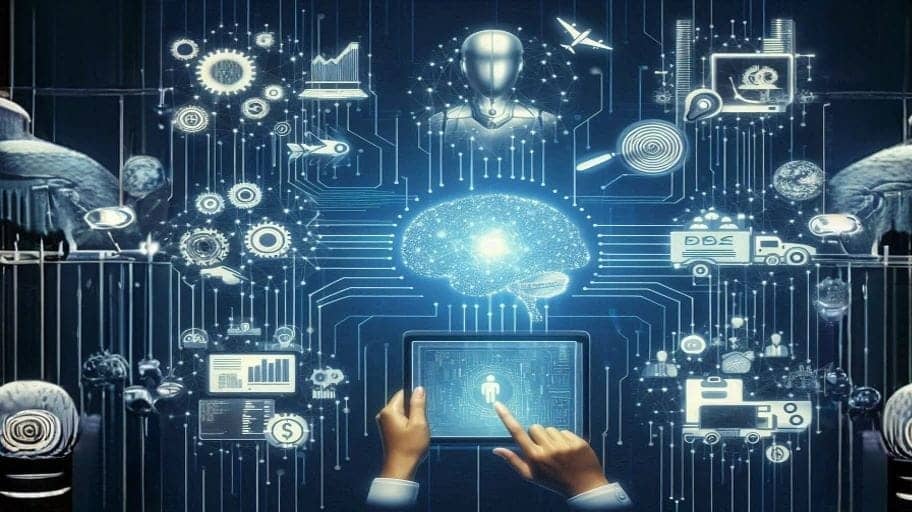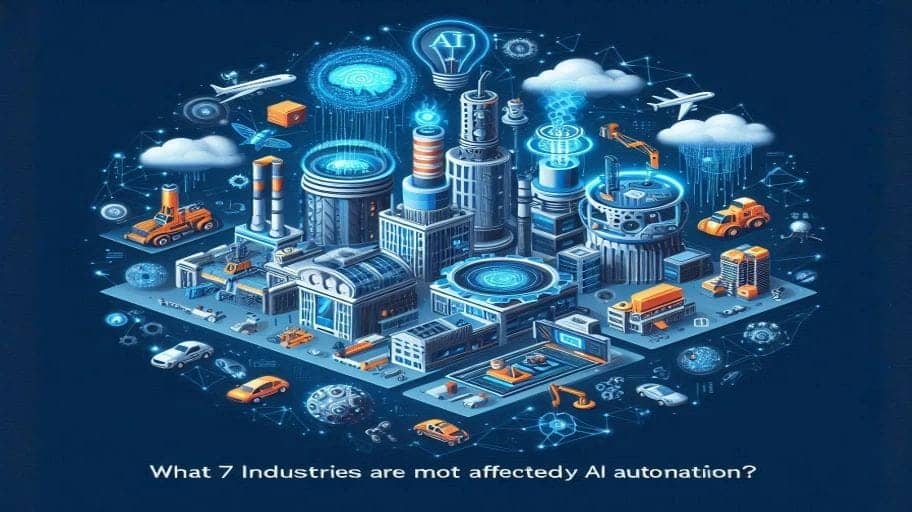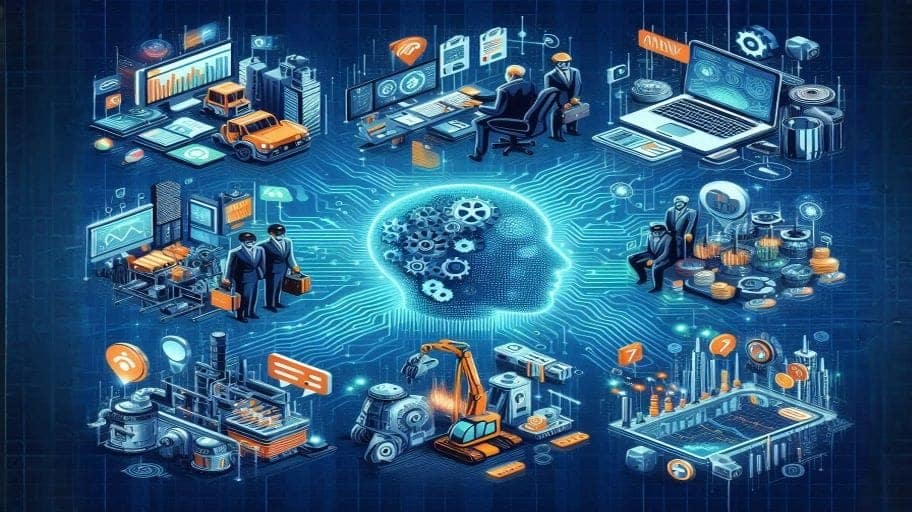Industries that are most affected by AI Automation
AI automation is irrevocably changing industries at a completely different pace, changing processes and workflows with improved efficiency. The influence of AI automation can thus be seen in manufacturing, finance, healthcare, and many other sectors where business and interaction with technology are fundamentally changing. Artificial intelligence has increased productivity and growth while reducing the need for human intervention in process automation. This article focuses on seven industries most influenced by AI automation, considering their shifts toward AI-driven efficiency.
1. Manufacturing
Most importantly, AI automation has revolutionized the number of laborers required in manufacturing through the use of advanced robotics that take over repetitive tasks. AI in automation has been helpful as it may result in quicker times of production, fewer errors, and more constant quality regarding the manufacturing process. For example, the predictability of maintenance that AI automation provides ensures that machines can detect the likelihood of an issue before breakdowns occur. This greatly reduces downtime and increases productivity on the factory floor.
The next useful application area for AI-driven workflow automation in manufacturing is quality control and supply chain management. The AI automation systems will ensure optimal output levels by continuously monitoring performance, managing logistics, and making sure there is consistency. The combination of Robotics Process Automation and Artificial Intelligence has been increasing productivity in tasks related to packaging, assembling of products, and warehouse management.
AI automation made manufacturing companies more efficient in operations, cost reduction, and improving product quality. Turning to AI-powered automation tools, industries are finding their strategic positioning for sustainability in the competitive, fast-evolving market.
2. Finance
Artificial intelligence has brought tremendous change in the financial sector, from customer service chatbots to fraud-detecting algorithms. Automation tools of AI today carry out various core banking operations, such as analytics and data, processing transactions, and managing risks. AI process automation helps financial organizations propose customized services, automate loan processing, and ensure seamless workflow management.
Right from risk assessment, fraud detection, and investment advisory services, AI automation in banking is enabling faster and more accurate decision-making. Automated customer service with AI chatbots answering routine questions and the transformation of back-office processes with the help of RPA and AI are only parts of the greater picture of AI technologies. Applications of AI technologies in the automation of regulations applicable to banks have also been carried out, saving companies time and reducing errors.
Moreover, AI is making it possible for many firms to sort and analyze data through artificial intelligence. It helps manage its complex data and pulls actionable insights from the datasets. AI workflow automation supports many of the everyday operations in the financial sector, creating smoother processes and better accuracy in addition to saving money.
3. Healthcare
AI automation is the application of technologies to optimize and automate processes in health care, administration, and patient care, which range from fast diagnosis to turning points in patient care. AI automation affords healthcare providers better, faster, and more accurate diagnoses to better patient outcomes. Robots are even associated with robotic surgeries that have resulted in minimally invasive procedures done with fantastic precision. Such automations speed up the recovery process.
AI improves diagnostic precision by analyzing data that comes from X-rays, MRIs, and CT scans in medical imaging. AI automation tools help in managing patient records, scheduling appointments, and automating billing processes, which reduces the burden of administration on the healthcare staff. When used in marketing, AI tools increase patient engagement by managing campaigns and delivering health messages to the intended target.
AI automation in research and development speeds up the drug discovery process, whereas AI, with its capacity to analyze large data sets, can select potentially more effective candidates for new therapies. Also, automation allows healthcare professionals to be more efficient when dealing with patient care and operations through the simplification of workflow and automation of other low-value tasks.
4. Retail
AI reshapes the customer experience, inventory management, and operations efficiencies within a retail space. AI-powered chatbots and virtual assistants can provide instant, real-time customer support with product knowledge, product suggestions, and issue resolution. Such tools also increase the customer experience by utilizing data from previous touchpoints with the customer to make suggestions for the next shopping experience.
Automation through artificial intelligence goes as far as supply chain management within the retail sector, where systems based on AI control inventory levels, predict demand, and optimize logistics. Automated check-out systems are gaining ground, eradicating the need for too much labor. AI and automation help the retailer understand the dynamics of his customers, thus, deriving good marketing strategies and improving sales.
AI process automation enables companies to look up data comprehensively and accurately, helping to keep up with market trends and customer demand. Automated content generation is also incorporated into retail for the preparation of materials.
5. Transportation and Logistics
Such automation has had a significant impact on the transport and logistics sectors, in general, but has been most evident in autonomous vehicles, route optimization, and supply chain management. AI-based automated tools aid us in transforming logistics companies into providers of fuel consumption-saving and time-saving optimized routes, while unmanned drones and trucks are busy changing the logistics game.
Artificial intelligence automation supports transportation companies in achieving more efficiency in managing their fleets, which results from the prediction of fleet maintenance needs, optimization of fuel usage, and upliftment of safety standards. Whenever new transportation technologies are tested for feasibility, there are automation tools found in artificial intelligence that need to ensure the reliability and safety of this system before it hits the open market. AI empowers logistics companies to further automate and optimize their shipping schedules in addition to ad hoc responses to real-time conditions, be it weather or traffic.
The implementation of AI and RPA is paying rich dividends in terms of cost, reduction in delivery time, and enhancement in reliability in operation in transportation and logistics.
6. Education
AI automation is transforming education by taking the bulk of administrative work out of the teachers’ hands, providing personal learning options, and enhancing distance learning experiences. Not only that, artificial intelligence allows teachers to automate the grading process, provide personalized feedback, and offer administration processes for tasks like enrollment and scheduling.
AI content-generating tools enable the customization of learning materials to the student’s specific needs, which in turn personalizes learning for the students. AI-based marketing automation tools empower institutions to target prospective students, manage campaigns, and improve critical operations on admissions.
AI automation in education also extends to virtual classrooms. Here, AI tools help in interactive learning and manage the participation of students. Artificial intelligence automation will ensure that teachers are more focused on the supposed task—to teach—than administrators. As a result, better student experiences will be the outcome.
7. Marketing and Advertising
The astonishing fact is what AI automation has done to most marketers’ and advertisers’ current practices by filling gaps such as repetitive tasks, targeting customers, and optimizing campaigns. Analysis of customer behavior, prediction of trends, and the ability to serve personalized content to optimized audiences nowadays are possible due to artificial intelligence. With the help of AI email automation, marketers can automatically manage campaigns and lead nurseries.
➥ How Machine Learning is Changing Digital Marketing
Additionally, AI-driven marketing automation tools can further help in content creation, social media management, and data analysis. The tool makes it easier to create artificial intelligence-driven content since it generates audience-engaging ad copy and automatically composes blogs and social media posts. These tools free up time for marketers, who can then reallocate the saved time to strategy and creativity.
Artificial intelligence process automation enables organizations to mine numerous data points and, on a real-time basis, make changes within campaigns that will help achieve even better results. AI workflow automation adds that extra flair of assurance that teams will not be making any errors in the process of handling the campaigns.
Conclusion
Impact-wise, AI automation in industries is quite groundbreaking; it is changing the way companies operate and delivers efficiency across the board. From manufacturing and finance to healthcare and education, AI empowers businesses to streamline process efficiency and improve decision-making abilities by enhancing customer experiences in novel ways. Now, AI has spread like wildfire across industries, and possibilities for organic growth and transformation are big.
Workflow automation, which is made possible by process automation and artificial intelligence, is already changing business. Organizations that embrace this change will be better positioned to remain competitive in an AI-driven world.



